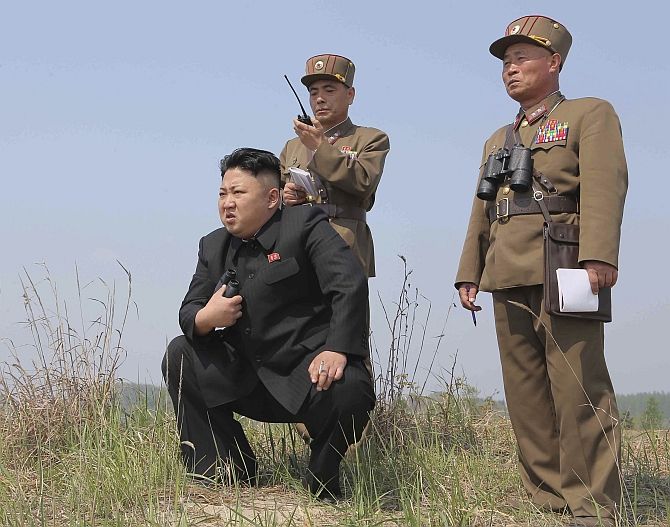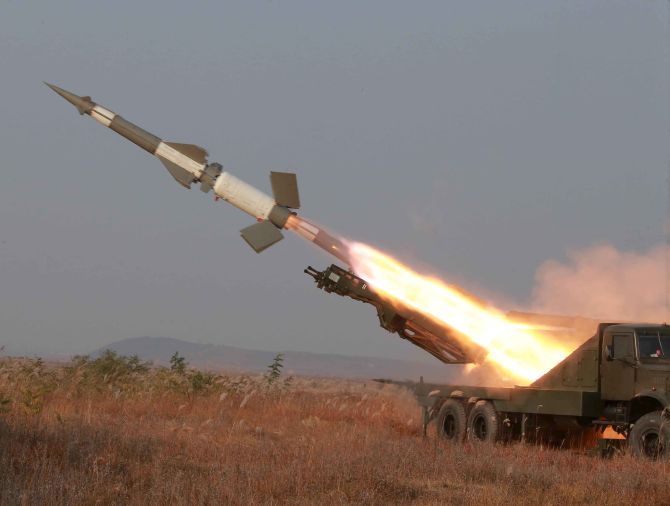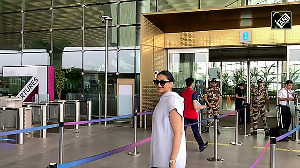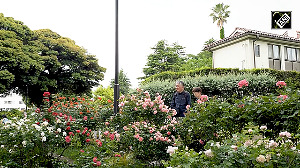Pyongyang wants the world to recognise its nuclear capability, says Srikanth Kondapalli.

Two major events in North Korea have heightened tensions in the region. On January 6, North Korea claimed it had tested a miniaturised hydrogen bomb and in sequence to its three fission tests in 2006, 2009 and 2013. This follows its submarine launched ballistic missile test in December.
Further, North Korea alerted the United Nations on February 2 that it would launch an 'earth observation satellite' between February 8 and 25. The United States, Japan, and South Korea believe this could be a missile test and hence are making diplomatic and military counter-preparations such as ballistic missile defence surveillance, alert and preparations.
In December 2012, North Korea launched what it described as a communication satellite indicating mastery over dual use technologies.
The nuclear tests and other related events suggests that the young North Korean leader Kim Jong-un has been consolidating his power by executing his uncle Jang Song-taek in 2013, defence minister Hyon Yong-chol in 2015, and replacing nearly half of top-level civilian and military officials. He cancelled visits to Moscow and Beijing possibly to further consolidate his position before the May 2016 ruling party congress.
At a minimum Pyongyang wants the international community to recognise its nuclear capability and diplomatic recognition from the United States.
While the economy had shown some signs of improvement recently, it is likely that North Korea will trade its nuclear and ballistic missile technology expertise with other countries in the future to earn hard currency, with implications to the stability issues.
As the pattern in the recent times indicated on 'countries of concern,' sanctions will follow but with the blessings of Beijing and Washington, Pyongyang is likely to be bailed out in the medium term.
The uninterrupted North Korean nuclear programme ones again brought China's role into focus. Beijing had shielded Pyongyang for decades despite differences. China followed an ambiguous policy on the North Korea nuclear issue, although when it came to Indian nuclear tests, Beijing has exhibited a vitriolic position till now.
Even as it condemned Pyongyang's nuclear tests and supported the United Nations Security Council sanctions, it had also brought Pyongyang to the negotiating table at the six rounds of the six-party talks in 2003-2008. However, no concrete road map on denuclearisation has taken place so far.
It is interesting that while Beijing distanced from Pyongyang, it had not abrogated the military alliance of 1963 with North Korea.
China also has good relations with Pyongyang as seen in trade, aid, high level visits of ranking Politburo members Liu Yunshan and Zhang Dejiang, who is a product of Kim Il-Sung University. Bilateral trade increased from $1.7 billion in 2006 to $6.54 billion in 2013 and $6.87 in 2014 but declined to $4.9 billion in 2015.

In late 2015, after hyping up the cultural show of the all-female popular Moranbong band to Beijing, the concert was abruptly cancelled. If China intends to put pressure on North Korea, it could provide refuge to the North Korean people (estimated 2 to 3 million refugee flow), cut off trade and aid (Sino-North Korean trade accounts for 70 to 80 per cent of the latter's trade volume), stop the much needed energy flows to Pyongyang, persuade Pyongyang to return to the six-party talks and strike at the North Korean nuclear and ballistic missile sites (as Israel contemplated to do to Iran and Iraq).
Except for rhetorical statements by China, none of these are likely to happen. It suits China to keep the current status quo in the region. China, of course, is concerned that Japan and South Korea have reached an understanding on their historical differences in late 2015 and are poised to expand defence ties with the US further.
South Korea has huge stakes on the nuclear issue. South Korean President Park Geun-hye met President Xi Jinping six times already and attended the September 3, 2015 Beijing military parade in addition to joining the Beijing-sponsored Asian Infrastructure Investment Bank. However, Seoul is concerned about lack of any progress in Beijing's approach towards Pyongyang.
China has become South Korea's largest trading partner with over $300 billion in 2015 from $6 billion in 1992 after the resumption of diplomatic ties. South Korean Foreign Minister Yun Byung-se termed the 4th nuclear test by Pyongyang as a 'game changer.'
Hwang Joon-kook, the South Korean chief negotiator for the six-party talks, met with Chinese counterpart Wu Dawei on June 10, 2014 for resuming the talks, but in vain. The 2010 Cheonan-corvette shrinking and the Yeongpyeong firing incidents rattled the South Koreans.
South Korea is likely to pressurise Beijing to take a more pro-active position in curbing North Korean nuclear ambitions. There is an increasing feeling in Seoul that China is just 'milking' Seoul and Washington on the North Koran issue without any concrete progress. It had also resumed anti-North Korean broadcasts. Seoul is also likely to strengthen the Terminal High Altitude Air Defence System from the US -- a bone of contention with China.
The United States followed a zig-zag policy on the North Korea nuclear issue from actively exploring military options for regime change to that of six-party talks and aid and energy supplies to sanctions and to the recent 'strategic patience' plan.
Four days after the January 6 test, the US flew a B-52 bomber across the Korean peninsula. US Secretary of State John Kerry told China to avoid a 'business as usual' attitude and take concrete steps for denuclearisation of the Korean peninsula.
The US will again be disappointed, and after years of talks could follow the same policy with North Korea as on Iran.
Srikanth Kondapalli is a professor at Jawaharlal Nehru University.











